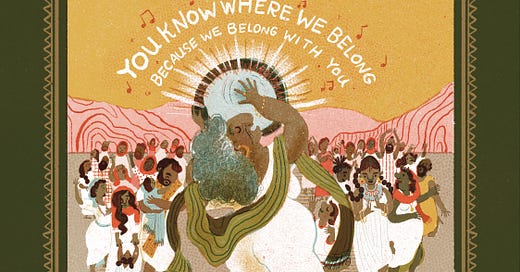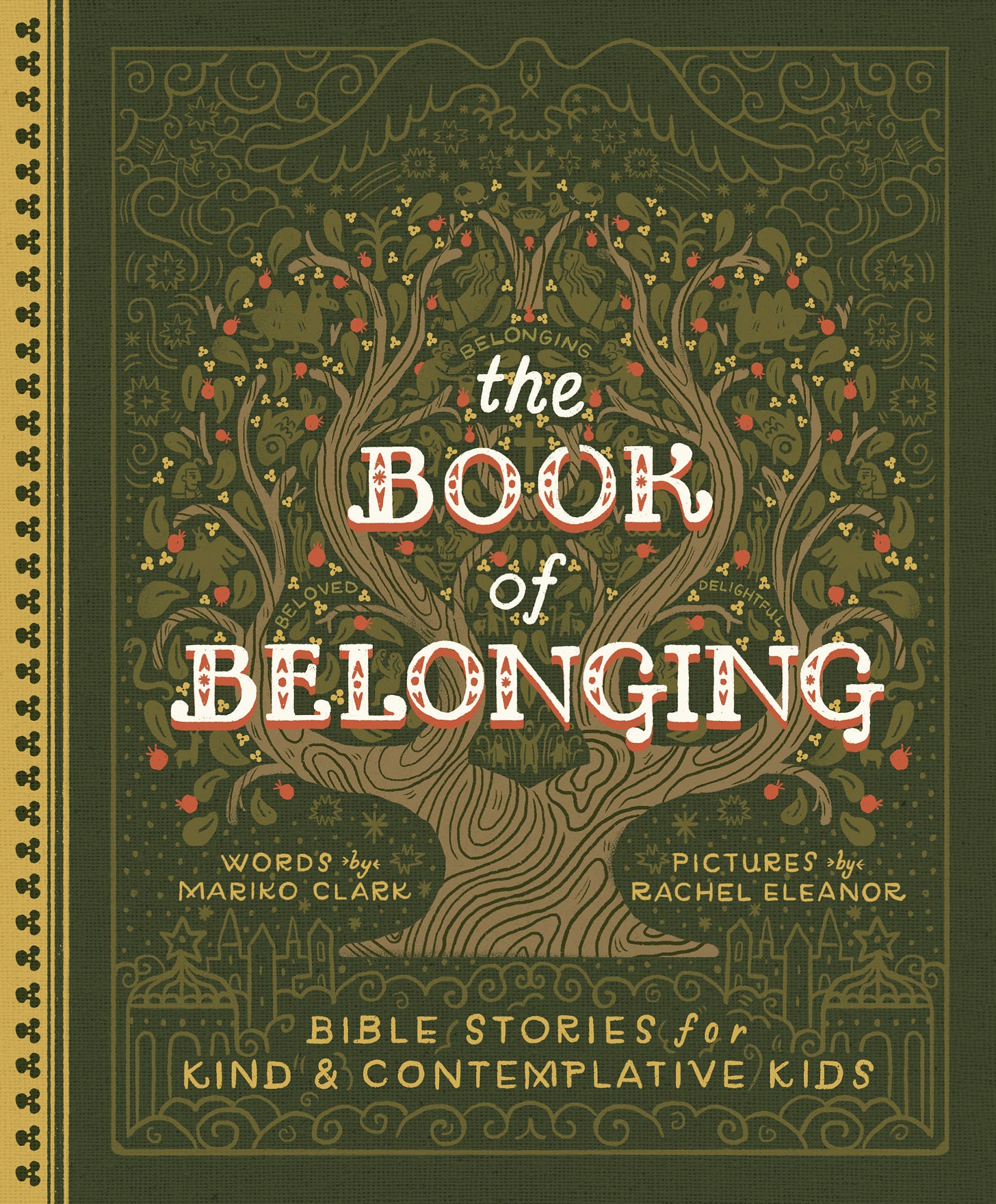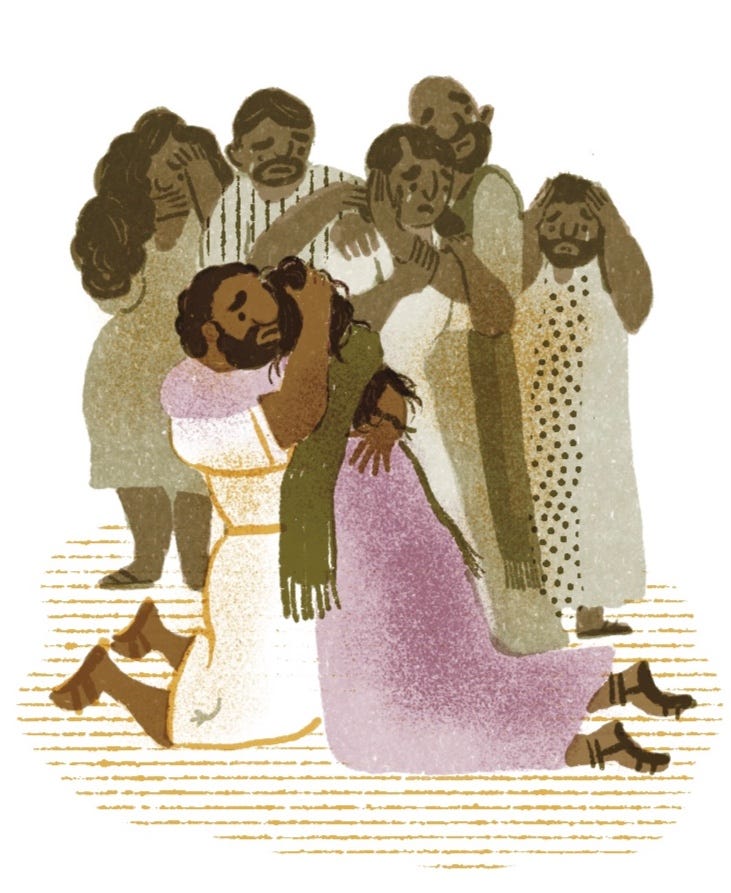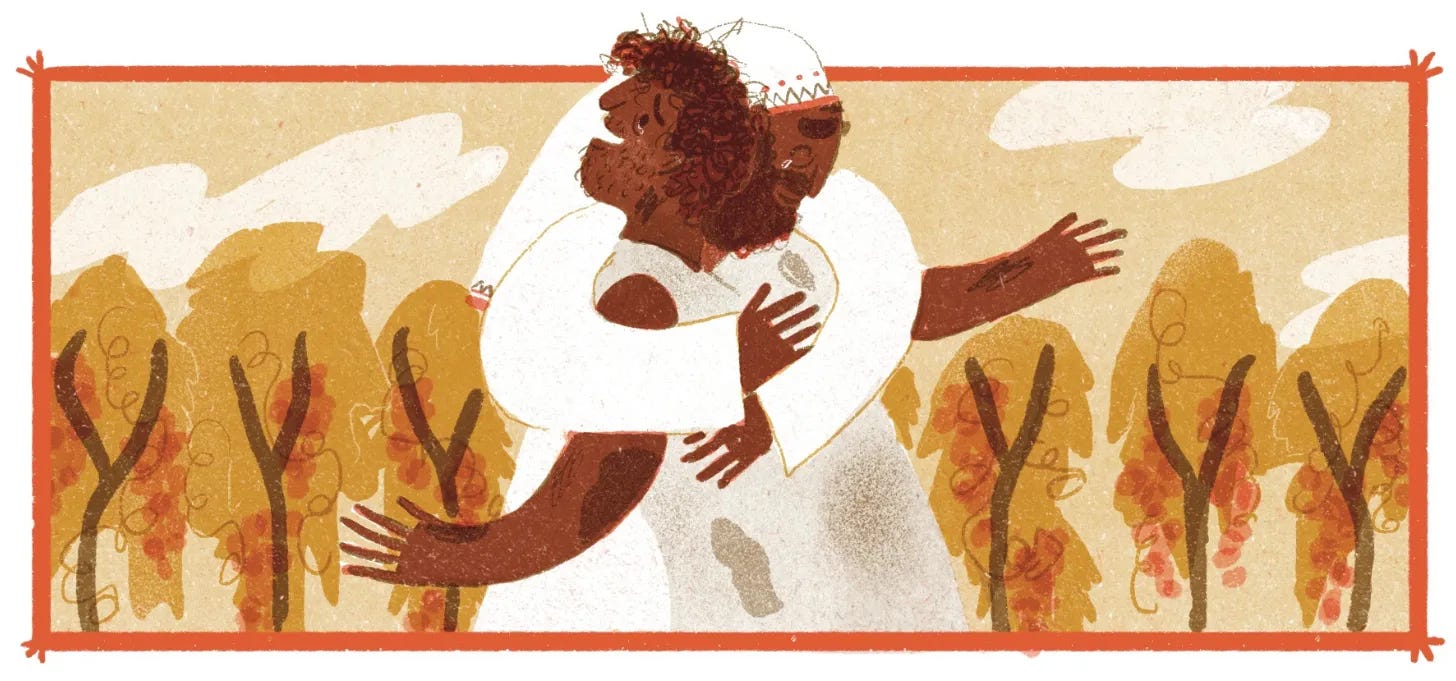The possibility of healing through better story-telling
A guest essay by Mariko Clark, author of "The Book of Belonging" + a giveaway
Hi friends,
Back in 2019 at our Evolving Faith gathering in Denver, we invited our dear friend and children’s book author Matthew Paul Turner to read aloud from his book When God Made You from the main stage between sessions. We often heard from folks with little people in their lives who were longing for actually helpful resources to teach their kids about God without a lot of baggage and we thought this would be a great way for them to realise that there are books like this out here, books that you don’t have to edit on the fly as you read aloud (been there) or that cause nightmares in sensitive kids (done that) or that your kids don’t have to heal from later (have the t-shirt).
But as Matthew read the beautiful book aloud to the more than 2300 folks gathered there in the auditorium, something unexpected happened: people began to weep. Tissues were passed. Hearts were clutched. “I really needed that,” was said over and over. As I looked around the room, I saw that this book - which he had quite clearly written for children - was somehow healing that heart-hungry kid so many of us carry inside still. That “children’s book” was clearly not just for the children. It was for the kid in all of us. We all needed that message on that day.
As a mum of four myself, I do always have my eye out for children’s books and particularly Bibles that build strong foundations and speak timeless truth to my kids. I’m always looking for good language and images which communicate how much God loves us and how we are called to love one another well. But since that day with Matthew at the gathering, I’ve become highly aware that those same books for kids can actually end up healing the grown-up reading them, too.
Why? Well, many folks were discipled at a young age to believe that they were wicked or broken, sinful or disappointing to God (or our caregivers). And so our base code setting for how we see God or ourselves or the world is still set to believe that we are a disappointment to God, broken even. The tears in that room were a sign that Matthew’s words were doing important work, healing work, in us. During my time leading Evolving Faith I came to realize that as we grow up, we often have to do the work of “re-parenting” ourselves in matters of faith too and yes, part of that work can be healing what we were taught about how God sees the child-version of us.1 There is a pathway towards healing in better story-telling. It’s an important part of our post-deconstruction life.
That is one of the reasons why I asked this writer to join us here at Field Notes.
When I first read Mariko Clark’s retelling of the Bible’s stories called The Book of Belonging, I was so impressed and deeply moved. In cooperation with the sincerely gorgeous illustrations by Rachel Eleanor, Mariko re-tells the Bible stories we think we know - and a few that we may have missed, as you’ll see below - through the lens of celebratory diversity and inclusion, kind contemplation, “wonder moments,” blessing, and invitations to love. (I may never recover from that last chapter about Revelation.) These stories are beautifully told with powerful imagining, mindful moments, and invitations to questions or conversation. As I read it aloud to one of our kids, my voice kept catching on beautiful lines that I hope are written on her heart: “This child belongs. This child is beloved. This child is a delight.”
I’m so excited to introduce you to this lovely and strong book that will set the kids in your life up well but also do healing work for us grown-ups, too. It’s Bible stories2 that you will buy for the kid in your life but end up sneaking back to read for your own devotions and conversations, too.
*We have 3 copies of The Book of Belonging to give away to readers today too so keep scrolling down to see how to enter to win below…
“Mom, does God love boys more than girls?”
by Mariko Clark
There is something that I believe will happen to all of us, if we live long and lovingly enough: A younger person will come to us with a question. They will offer it to us with trust. And as we hold it, like a fragile baby chick, we will notice how familiar it seems. Something in the weight, in the gaze, in the pricking of our palms. This question will recall our deepest pain in a way that is so specific that it is nearly offensive.
“Mom, does God love boys more than girls?”
This question twisted up under my ribs and into my past. In her own pursuit of belonging, my daughter nudged my own.
But if we can stand it—if we can stay present with the discomfort—our attempt to answer the kids in our lives might just lead us toward healing for the kid in our heart.
And so it is with me and belonging.
Five years ago, my daughter dropped her question in my lap. The little story bible on our shelf at the time included only two female-centric stories, and her five-year-old brain drew its own conclusions. Conclusions that echoed, raw and familiar, in my own heart. At that point, I had been in therapy for years, learning to speak with compassion and encouragement to the younger version of me who grew up—spicy, curious, female—in Christian fundamentalism.
I grew up in a culture bereft of belonging. I was given a construct of love defined by exclusivity—you’re in if you think the same types of people are out.
I was taught that obedience would keep me in. A memorization of rules and a hustle to modify my behavior based on “Biblical truth” which was supposed to be timeless, perfect, and unequivocal. Certainty was what I was sold, even as experience pulled me toward mystery.
I was told repeatedly that “God is better than you can imagine.” But when I used my sacred imagination to envision a place to belong—one shaped by more diverse, equitable, and inclusive storytelling, interpretation, and worship—that imagination was squashed.
I grew tired of splitting my soul. Tired of welcoming others to a place that didn’t welcome my fullness. Tired of parenting with more compassion than I was told God has. Tired of leadership that elevates “Biblical values” and not the fruit of the Spirit. Tired of loving my neighbor with asterisks.
My daughter broke my heart with her question, and I spent the next five years answering her—researching and writing the story bible I needed when I was younger. The stories that would have welcomed me and my spicy, curious questions. The characters that would have honed my leadership and embodied my doubts and fears. The wonder and contemplation that could have fortified me in times when God felt far or contradictory.
I wrote with the goal of introducing the kids in my life (and the kid in my heart) to a God who can be trusted—an expansive God with whom everyone belongs. But belonging isn’t a container I twisted the Biblical message into. It’s the message that’s kept me coming back to a table I was told had no place for me. It’s the satisfaction of my most aching curiosities. It’s the theme I found most clearly threaded throughout scripture.
I found it in the subtleties of the Genesis poem, with God’s delight over humans at its core.
I found it in the life, ministry and death of Jesus, as he repeatedly aligned himself with the marginalized and challenged the systems that pushed them to the edges.
I found it in the stories kept from us. The nameless women. The women who were only afforded one or two sentences. The women whose stories were excluded from children’s collections to prioritize traditional favorites.
Like the first story I wrote: The Five Fearless Sisters. It’s right there in Numbers 27: a man named Zelophehad dies, leaving his five daughters without a male heir. Mahlah, Noah, Hoglah, Milcah and Tirzah bring their case before Moses, the elders and God. They receive a unanimous ruling and a permanent update to the law: females have a right to inheritance. It’s gutsy, it’s concise, it’s warm – it’s story bible gold. And yet, most people have never heard it.
Most of us were never told how unapologetically these spicy, curious girls insisted on their own belonging. Most of us were never told how vehemently God agreed with them. And how overtly the law was expanded on their behalf.
Before I wrote The Book of Belonging, I told this story to my kids often. I have a daughter named Noah and I wanted her to hear her origin story. I wanted her to know that belonging is her birthright. And the child in my heart took notice. The five fearless sisters knew that obedience is not what keeps you. They didn’t split their souls. They used their sacred imaginations to envision a place to belong through more diverse, equitable and inclusive laws. They asked God do you love boys more than girls? And God answered with an unequivocal NO.
God met them there, expanding God’s people’s understanding of who belongs again and again throughout this story and many others. My book is called The Book of Belonging because God is a God of belonging. It’s what the whole, big story is about. I belong with you and you belong with me. You’re my beloved. In a garden, in a family, in a tabernacle, in a kingdom, in Jesus and now in human hearts everywhere.
Five years ago, my daughter came to me with her question. I parented and reparented my way into an answer. One that healed me and affirmed what some part of me knew all along.
Growing up fundamentalist, there were really only two expectations for my little life:
That I would marry a man of God and have many babies…
And that I would, to quote 1 Peter 3:15, “always be ready to give an answer for the hope I have.”
What I couldn’t have prepared for was the circuitous, sacred path I’d take to live into—and through—those expectations.
That my spicy, curious self would give birth to a spicy, curious mini-me.
That she would ask the kinds of questions that set my heart on fire.
And that my answers—halting, tender, searching—would lead me to the hope I now hold:
When it comes to the love of God, everyone belongs.
Mariko Clark is a Japanese American author, mother, and storyteller on a mission to help kids embrace diversity and wonder. Her time as an editor with National Geographic Learning sharpened her ability to make complex topics accessible and engaging. She equips kids and caregivers with spiritual resources to navigate the messy middle, wrestle with tough questions, and find community in the journey. Mariko lives outside of Indianapolis with her husband and three sweet and spicy kids.
Thank you so much, Mariko! And thank you to Rachel for allowing us to include her beautiful illustrations, too.
If you want to buy the book - and I think you do! - here’s a link to Penguin Random House’s website for retailers. Here is a Bookshop.org for our American friends and for us Canadians, here’s the link to the Indie Bookstores and at Chapters Indigo.
Bonus: You can find here on Substack, too. It’s a weekly Sabbath resource of sacred practices for folks in liminal faith spaces. Their offerings are a mix of explicitly religious practices as well as mindful and somatic practices, all family friendly and including visual resources!
Giveaway + Community Conversation
I’ve got 3 copies of The Book of Belonging to give away here in our community!
Tell us: just as Mariko’s daughter’s question ignited her book, I’m curious which questions have ignited you? What is a question that you (or someone you love) asked that sparked a renewal or perhaps a crisis or an invitation to explore deeper? Where did answering that question lead you?
(If you can’t think of an answer to that prompt, feel free to respond to Mariko’s essay in your own way.)
I’ll randomly choose 3 commenters to each receive a copy of Mariko and Rachel’s The Book of Belonging. I’m afraid we can only manage USA and Canadian addresses though due to postage costs, so keep that in mind. We’ll pull the winners and update this post in a week with those. Winners will be contacted using the email you used to sign up here and will receive their book directly from the publisher. Comments are open so everyone can join in today.
EDITED TO ADD: Contest is now closed. Winners have been notified. Thank you to everyone for such lovely comments!
I hope you know God delights in you,
S.
Check out all of my books | Field Notes | Instagram | Facebook | SarahBessey.com
Um, I did not realise just how much I was reading until now 📚: My recent ⭐️⭐️⭐️⭐️⭐️ reads + a poll for our upcoming series
Imagining a world that is steadily and communally good: Or, 3 Ways Walter Brueggemann's work mattered to me
22 New Breath Prayers: Faithfulness: Sincerity over cynicism, faithfulness over despair.
Yet another thing I am still learning: On rest, restoration, wild places, and the smell of the earth after rain
A Benediction for the (Stubborn) Ones Still Holding On: Or, a blessing for those still calling themselves Christians
I’m working on putting together a larger list of resources for kids’ stories and lit that may be helpful so stay tuned for that, too!
Mariko and Rachel share a publisher with yours truly in Convergent Books but this post is not sponsored or encouraged in any way. I directly reached out to Mariko myself. This feature is a genuine share and invitation. Just an FYI for the curious.









You wouldn't believe it! I went to the library with my kids yesterday and saw The Book of Belonging at the shelf. It wasn't even on display, but it somehow called my attention. I started browsing and saw it was a Bible with beautiful brown pictures! I had just donated my children's Bibles for that reason- we couldn't see ourselves in them. I read the first story- Creation- and I was hooked. So we brought it home to read from the library! Then this morning I see this essay! What a gift! Thank you, Mariko! And thank you Sarah! I'd love to have our own copy to read beyond the due date!
Two questions that shifted everything for me were:
1. Why would I want a relationship with a God who puts some of creation in a torture chamber after they die? (All I could says was, ya, why would I?)
2. What if this faith thing is not about original sin but about original goodness?
Thank God for questions.